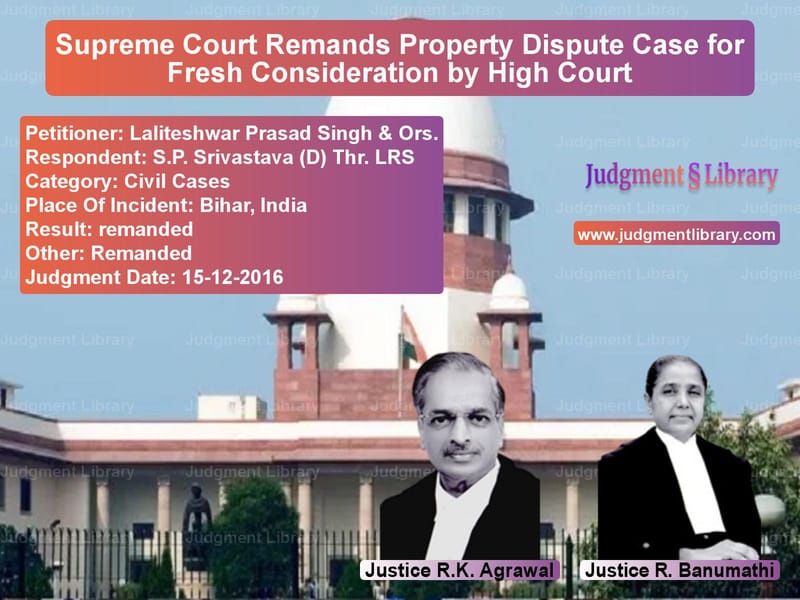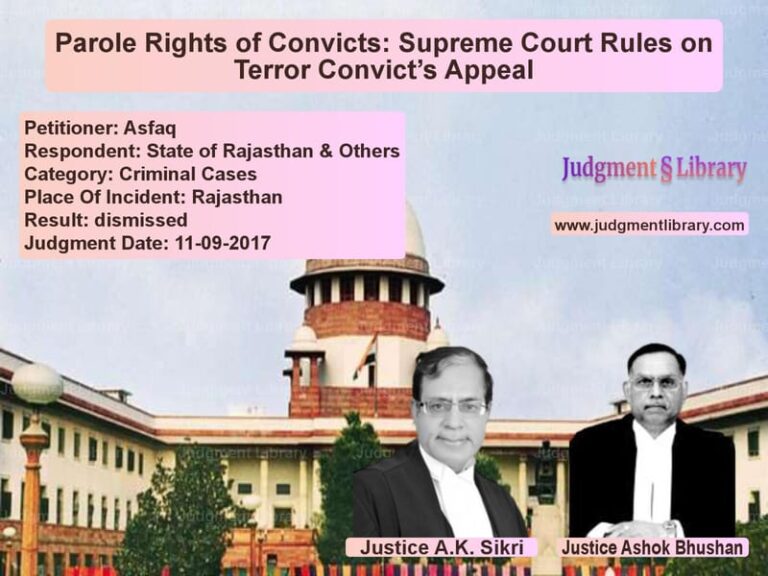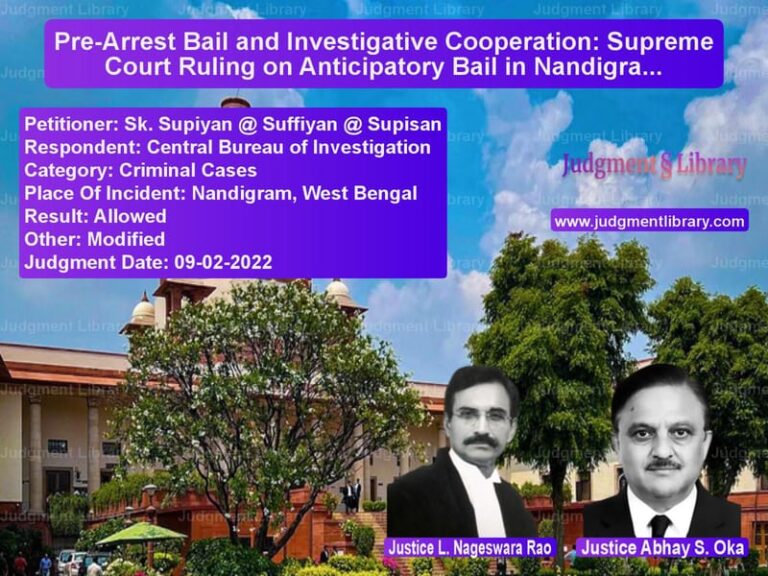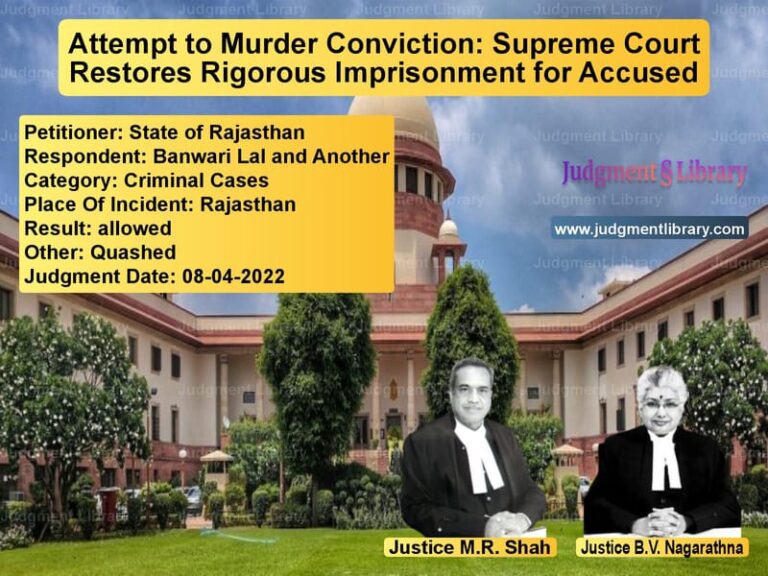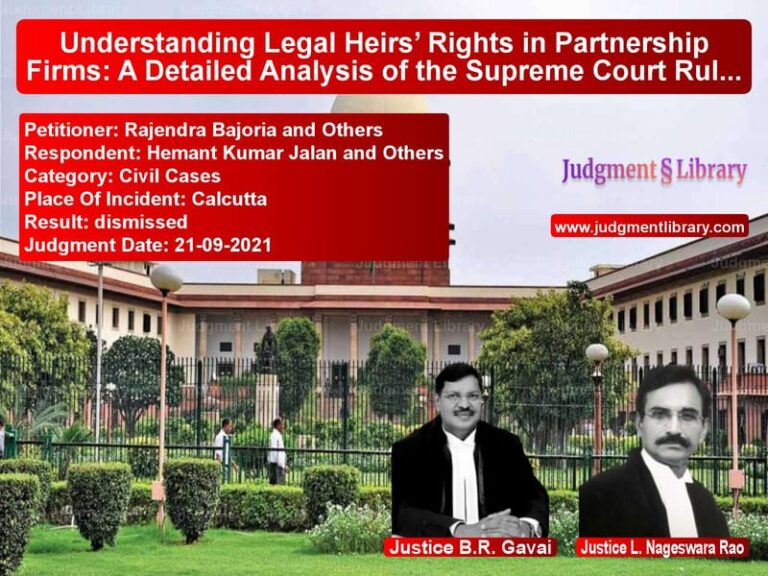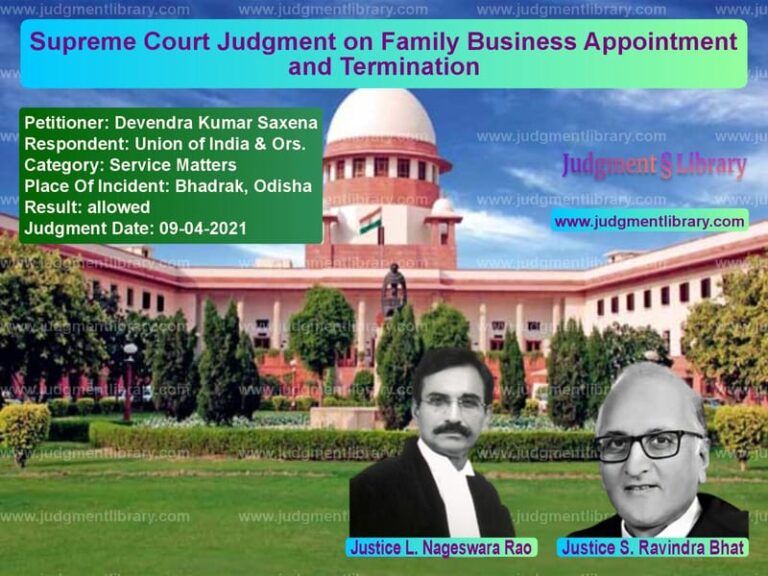Supreme Court Remands Property Dispute Case for Fresh Consideration by High Court
The case of Laliteshwar Prasad Singh & Ors. vs. S.P. Srivastava (D) Thr. LRS involved a dispute over property ownership. The Supreme Court remanded the case back to the High Court, directing it to reconsider the matter while affording both parties an opportunity to present additional evidence. The judgment highlighted the importance of due process in appellate proceedings, especially in cases involving complex property rights under the Hindu Succession Act.
Background of the Case
The plaintiff, Shailendra Prasad Srivastava, filed a suit seeking a declaration of title over property listed in Schedule I and Schedule II, situated in villages Bairiya and Koloha Pagambarpur. He claimed that the property belonged to Girish Chandra Prasad and was recorded in the name of Umashanker Prasad during the Revisional Survey. Umashanker Prasad died in 1965, and after his grandmother, Tarawati Devi, passed away in 1985, the plaintiff argued that he was the rightful successor.
The defendant, Baidya Nath Prasad Verma, disputed this claim, asserting that the property belonged to Dhanukdhari Sahay, father of Tarawati Devi, and that he, being a legal heir of Sahay, had rightfully inherited it. The trial court ruled in favor of the defendant, holding that the plaintiff failed to produce sufficient documentary evidence to establish title.
High Court’s Decision
The High Court reversed the trial court’s decision, finding that:
- The Revisional Survey Record of Rights showed the property in the name of Umashanker Prasad, supporting the plaintiff’s claim.
- Rent receipts in the names of Girish Chandra Prasad and the plaintiff further substantiated ownership.
- The defendant failed to prove his claim that the property originally belonged to Dhanukdhari Sahay.
Based on these findings, the High Court declared the plaintiff as the rightful owner.
Supreme Court’s Review
The defendants challenged the High Court’s ruling, arguing:
- The plaintiff did not produce any actual title deeds proving ownership.
- The High Court overlooked the plaintiff’s admission in cross-examination that Tarawati Devi had purchased land, contradicting his claim of inheritance.
- The High Court failed to consider the proviso to Section 34 of the Specific Relief Act, which states that a declaration of title cannot be granted without a consequential relief for possession.
Additionally, several appellants had purchased portions of the property from the defendant. They contended that the High Court, after allowing their impleadment in the case, did not afford them a fair opportunity to present their claims and evidence.
Supreme Court’s Judgment
The Supreme Court found merit in the appellants’ arguments and ruled:
“The High Court, being the first appellate court, should have considered the evidence adduced by both parties before reversing the trial court’s decision. Order XLI Rule 31 of the CPC mandates that an appellate judgment must clearly state the points for determination, the decision thereon, and the reasons for the decision.”
Key observations by the Court:
- The High Court failed to properly analyze evidence presented by the defendant, including the plaintiff’s contradictory statements.
- Documents such as rent receipts and mutation records are not conclusive proof of ownership.
- The High Court did not address whether the suit was maintainable in light of Section 34 of the Specific Relief Act.
- The impleaded appellants were not given an opportunity to present their evidence and claims.
Directions Given by the Supreme Court
The Supreme Court remanded the case to the High Court with the following instructions:
- The plaintiff must take steps to implead the legal representatives of the deceased second respondent-defendant.
- Both parties should be allowed to present additional oral and documentary evidence.
- The High Court must reconsider the case afresh, analyzing evidence from both sides.
- The appeal should be disposed of expeditiously, considering the case has been pending since 1994.
Conclusion
The Supreme Court’s ruling underscores the importance of procedural fairness in appellate cases. By remanding the case, the Court ensured that all parties have an equal opportunity to present their claims. The judgment serves as a precedent for ensuring that first appellate courts conduct a thorough review before reversing trial court findings, especially in property disputes involving complex inheritance claims.
Don’t miss out on the full details! Download the complete judgment in PDF format below and gain valuable insights instantly!
Download Judgment: Laliteshwar Prasad S vs S.P. Srivastava (D) Supreme Court of India Judgment Dated 15-12-2016.pdf
Direct Downlaod Judgment: Direct downlaod this Judgment
See all petitions in Property Disputes
See all petitions in Judgment by R K Agrawal
See all petitions in Judgment by R. Banumathi
See all petitions in Remanded
See all petitions in Remanded
See all petitions in supreme court of India judgments December 2016
See all petitions in 2016 judgments
See all posts in Civil Cases Category
See all allowed petitions in Civil Cases Category
See all Dismissed petitions in Civil Cases Category
See all partially allowed petitions in Civil Cases Category

